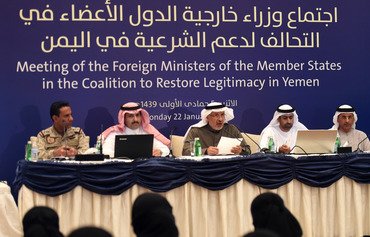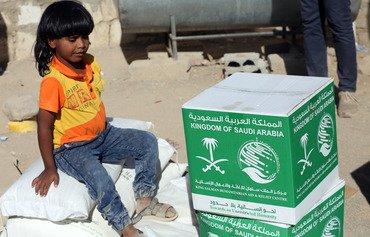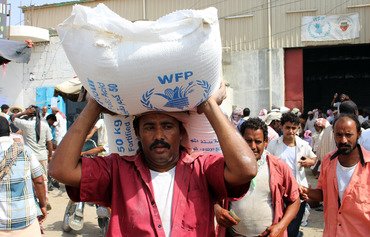Since its intervention in Yemen in support of the legitimate government, Saudi Arabia has played a key role in supporting the government and international organisations in their humanitarian response plan, Yemeni officials said.
Total Saudi assistance to Yemen since May 2015 amounts to $16 billion, according to King Salman Humanitarian Aid and Relief Centre (KSRelief) supervisor general Abdullah bin Abdulaziz al-Rabeeah.
Speaking at a late October meeting in Rome, he affirmed the kingdom's willingness to provide humanitarian aid with transparency and impartiality in all regions of Yemen, despite the challenges presented by the Houthis (Ansarallah).
Of the $16 billion in Saudi assistance to Yemen, al-Rabeeah said, close to $2.4 billion has been provided through KSRelief.
![Saudi Development and Reconstruction Programme for Yemen director Hassan al-Attas delivers a speech during the launching of multi-million dollar aid projects in the area of Yemen's northern coastal town of Midi on April 22nd. [Sayaf Ahmed/AFP]](/cnmi_am/images/2019/11/12/20822-Saudi-Yemen-aid-600_384.jpg)
Saudi Development and Reconstruction Programme for Yemen director Hassan al-Attas delivers a speech during the launching of multi-million dollar aid projects in the area of Yemen's northern coastal town of Midi on April 22nd. [Sayaf Ahmed/AFP]
These funds were funneled into 371 humanitarian projects of different kinds in co-operation with 80 international, regional and local partners, he said, in compliance with international humanitarian law that prohibits discrimination.
Relief and rehabilitation
Yemeni Minister of Local Administration and chairman of the Higher Relief Committee Abdel Raqib Fatah said the Houthis and their military coup against the government are largely to blame for the humanitarian crisis in Yemen.
Fatah, who has previously spoken out against the Houthis' diversion of humanitarian aid intended for the Yemeni people, also accused the Iran-backed militia of failing to accept a peaceful solution to the conflict.
The humanitarian and financial assistance Saudi Arabia has provided to Yemen "has produced tangible results", Yemen's Deputy Ministry of Human Rights Nabil Abdul Hafeez told Al-Mashareq.
It has improved the situation in the war-torn country "in terms of both the relief aspect and the rehabilitation of government services", he said.
Saudi support to Yemen's Central Bank "and to ensure financial and monetary stability and prevent the price of the dollar from going up" has had a direct effect in alleviating the suffering of the Yemeni people, he added.
This succeeded in halting "the depreciation in the value of the local currency, which had caused basic commodity prices to rise multifold", he explained.
"The Houthis caused the war and exacerbated the suffering of the population living in the areas under their control by perpetrating myriad abuses and placing obstacles and difficulties in the way of delivering aid," Abdul Hafeez said.
Documented cases of corruption in the Houthis' distribution of aid intended for the Yemeni people makes it clear the militia is incapable of governance in the areas it controls and is not concerned with the needs of the people, he said.
"In fact the opposite is true, as they have compounded their suffering and engaged in further abuses," Abdul Hafeez said.
Saudi support to Yemen
"Approximately 25% of [Saudi] assistance goes to supporting the service sector, 10% to the health sector and about 9% to the education sector," economist Abdul Aziz Thabet told Al-Mashareq.
"The rest is distributed among other sectors, particularly the effort to remove landmines, which claim the lives of innocents every day," he said.
"The Saudi support provided to Yemen through UN humanitarian agencies, especially the food, health and education assistance, supports the programmes run by these organisations," Thabet said.
The war with the Houthis, the resulting economic crisis, the layoffs of thousands of workers and the suspension of payment of salaries have compounded the suffering of around 20 million Yemenis, he said.
The Houthis have taken advantage of the aid provided, have put obstacles in the way of its delivery, "and other times sell it on the black market", Thabet added.
"The regional and international support for Yemen, particularly the Saudi support, is very important at this stage," Yemeni Studies and Economic Media Centre chairman Mustafa Nasr told Al-Mashareq.
Saudi support for Yemen's Central Bank "had a positive impact in terms of stabilising the Yemeni riyal, and we hope this direct support for the Yemeni economy will continue in the next stage", Nasr said.
He called for improvements in the mechanisms of humanitarian aid, and for reconstruction to begin, in order to help Yemen overcome its economic crisis.

![Displaced Yemenis gather to receive Saudi-provided food aid at a camp for the displaced in the Khokha district of al-Hodeidah on January 21st. [Saleh al-Obeidi/AFP]](/cnmi_am/images/2019/11/12/20821-Saudi-food-aid-600_384.jpg)






